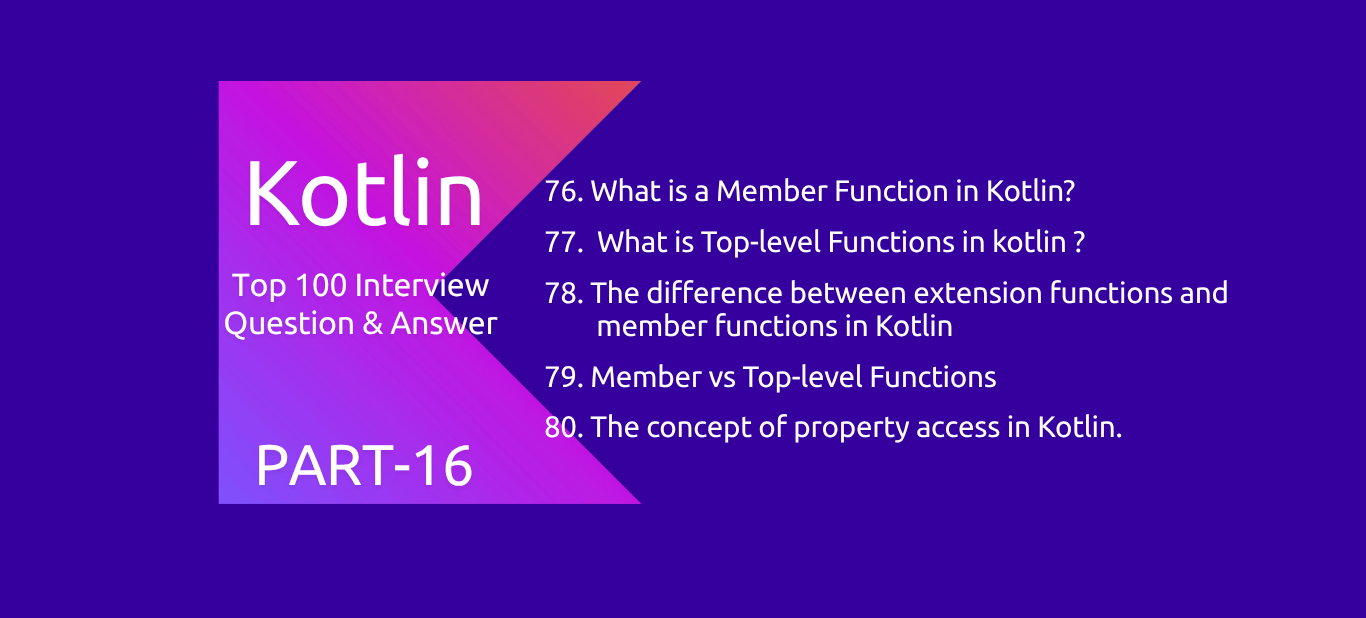Kotlin : 100 Interview Questions and Answers PART16
Kotlin is concise, expressive, and designed to improve developer productivity. It runs on the Java Virtual Machine (JVM), can be compiled to JavaScript, and supports native platforms via Kotlin/Native.

76. What is a Member Function in Kotlin?
A member function in Kotlin is a function that is defined inside a class or object. It operates on the instance of the class and can access its properties and other functions.
Example
class Person(val name: String, var age: Int) {
fun greet() {
println("Hello, my name is $name and I am $age years old.")
}
}Here, greet() is a member function of the Person class.
Characteristics of Member Functions
- 1. Belong to a class or object
- 2. Can access class-level properties and methods
- 3. Can be called using an object instance
- 4. Can be open, final, override, etc.
Types of Member Functions
1. Regular: Defined inside a class
2. Open / Override: For inheritance
3. Abstract: Must be implemented in subclasses
4. Companion Object Functions: Similar to static
5. Extension Functions: Defined outside but act like members (syntactic sugar)
77. What is Top-level Functions in kotlin ?
In Kotlin, top-level functions are functions that are declared outside any class, object, or interface. They are defined directly in a Kotlin file, not wrapped in a class like in Java.
Example
// File: Utils.kt
fun greet(name: String) {
println("Hello, $name!")
}You can call this function from anywhere in your code:
greet("Alice")No need to create an object or class like in Java.
Why Are Top-Level Functions Useful?
- ✅ Cleaner, more concise code
- ✅ No need to create utility classes (e.g., Utils, Helper)
- ✅ Better organization with Kotlin’s packages
- ✅ Can be marked @JvmStatic or @JvmName for Java interop
Comparision
| Feature | Kotlin (Top-Level) | Java (Traditional) |
|---|---|---|
| Syntax | fun greet(name: String) | public static void greet(...) |
| Belongs to | File | Class |
| Needs class/object? | ❌ No | ✅ Yes |
| Java interoperability | ✅ With @JvmName | — |
78. The difference between extension functions and member functions in Kotlin
- Member functions = native part of the class, full control and access, polymorphic
- Extension functions = syntactic sugar for adding functionality externally, cannot access private/protected members or be overridden
Here is a comparison table showing the key differences between Extension Functions and Member Functions in Kotlin:
| Feature | Member Function | Extension Function |
|---|---|---|
| Definition Location | Defined inside a class | Defined outside the class |
| Access to private members | ✅ Yes – full access to all members of the class | ❌ No – can access only public/protected members |
| Use of this | Refers to the current object of the class | Refers to the receiver object of the extension |
| Inheritance | ✅ Supports overriding via open and override | ❌ Cannot be overridden – behaves like static functions |
| Extension Target | Only to the class it belongs to | Can be added to any existing class, even Java classes |
| Code Modification | Requires modifying the class definition | Can extend classes without modifying their source code |
| Polymorphism | ✅ Fully supported | ❌ Not supported (resolved statically, not at runtime) |
| Best Use Case | When functionality is part of the class's core logic | When adding helper functions or utilities externally |
| Example | fun greet() { ... } inside a User class | fun User.greet() { ... } defined outside the User class |
79. Member vs Top-level Functions
| Feature | Member Function | Top-level Function |
|---|---|---|
| Declared inside | A class or object | Outside of any class |
| Called from | Object instance | Directly by name or package |
| Has access to | Class properties | Only what is in scope |
80. The concept of property access in Kotlin.
In Kotlin, property access refers to how variables (properties) are read and written, and how you can customize or intercept those operations using:
- 1. Getters (read access)
- 2. Setters (write access)
- 3. Backing fields
- 4. Delegated properties
1. Default Property Access
- Kotlin automatically provides a getter and setter for each property.
var name: String = "John"This is equivalent to:
var name: String = "John"
get() = field
set(value) {
field = value
}field is a backing field used to hold the actual value.
2. Custom Getter/Setter
You can override the default behavior.
var age: Int = 18
get() = field + 1 // Custom getter adds 1
set(value) {
field = if (value < 0) 0 else value
}
Output:
age = -5 // Sets to 0 (setter logic)
println(age) // Prints 1 (getter logic)
3. Read-only Properties (val)
val id: Int = 42Equivalent to:
val id: Int
get() = 42val only has a getter, no setter.
4. Delegated Property Access
val username: String by lazy { "user123" } // Read access is delegatedYou can also observe and veto changes with:
var count: Int by Delegates.observable(0) { prop, old, new ->
println("${prop.name} changed from $old to $new")
}
5. Backing Properties
Used when you want to control access to a property, but store the data in a different field.
private var _email = "test@example.com"
val email: String
get() = _email // Expose only getterUseful for encapsulation.
Importtant Table
| Feature | Description |
|---|---|
| get() | Custom read logic |
| set() | Custom write logic |
| field | Backing field keyword |
| val | Read-only property (getter only) |
| var | Read-write property (getter + setter) |
| by lazy | Lazy initialization |
| Delegates.observable | Trigger on value change |
| Backing property | Used for encapsulation and logic split |